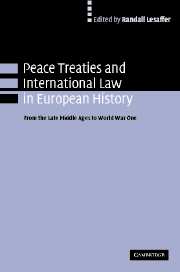Book contents
- Frontmatter
- Contents
- List of contributors
- Acknowledgements
- Table of Treaties
- List of abbreviations
- 1 Introduction
- PART I Peace treaties and international law from Lodi to Versailles (1454–1920)
- PART II Thinking peace: voices from the past
- PART III Thinking peace: towards a better future
- 11 Peace treaties, bonne foi and European civility in the Enlightenment
- 12 Peace, security and international organisations: the German international lawyers and the Hague Conferences
- 13 Consent and caution: Lassa Oppenheim and his reaction to World War I
- 14 Talking peace: social science, peace negotiations and the structure of politics
- PART IV Making peace: aspects of treaty practice
- PART V Conclusion
- Appendix
- Index
11 - Peace treaties, bonne foi and European civility in the Enlightenment
Published online by Cambridge University Press: 07 July 2009
- Frontmatter
- Contents
- List of contributors
- Acknowledgements
- Table of Treaties
- List of abbreviations
- 1 Introduction
- PART I Peace treaties and international law from Lodi to Versailles (1454–1920)
- PART II Thinking peace: voices from the past
- PART III Thinking peace: towards a better future
- 11 Peace treaties, bonne foi and European civility in the Enlightenment
- 12 Peace, security and international organisations: the German international lawyers and the Hague Conferences
- 13 Consent and caution: Lassa Oppenheim and his reaction to World War I
- 14 Talking peace: social science, peace negotiations and the structure of politics
- PART IV Making peace: aspects of treaty practice
- PART V Conclusion
- Appendix
- Index
Summary
Introduction
In the eighteenth century, diplomacy underwent a double transformation: it became permanent and it widened the scope of its interventions. Publicists and philosophers did not fail to notice this increasing importance of interstate relations. How did the men of the Enlightenment analyse this phenomenon? Diplomacy had always been the private domain of kings and princes. Did philosophers consider it a peacemaking institution or one of the many elements of a European ‘political system’ serving the reigning families? Were the reinforcement of the links between the states and the increase in the number of treaties forming the Droit public de l'Europe since the Westphalian Treaties regarded as the progress of civilising between the peoples or as a start for new claims and new conflicts? Throughout the eighteenth century, this debate poses the central question of the moral legitimacy of diplomacy and its relations with the law of peace. Although philosophers are critical of the European order and of the Machiavellian politics of princes, they still notice that peace treaties – as remote from the ‘true principles of morals’ as they are – remain of a distinctly ambivalent nature. Gabriel Bonnot de Mably (1709–85) particularly dwells on the necessary transparency of peace negotiations. According to him, diplomats should do away with the practice of vulgar politics, which consists of making treaty articles obscure; they should turn bonne foi into the cornerstone of their peaceful intentions.
- Type
- Chapter
- Information
- Peace Treaties and International Law in European HistoryFrom the Late Middle Ages to World War One, pp. 241 - 253Publisher: Cambridge University PressPrint publication year: 2004
- 1
- Cited by



